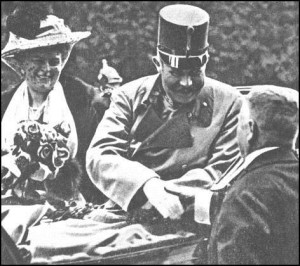
Archduke Franz Ferdinand and Duchess Sophie at Sarajevo on 28th June 1914 immediately before their assassination by Garvilo Princip.
On Sunday, June 28, 1914, in the small city of Sarajevo, Bosnia, a nineteen-year-old Bosnian Serb fired at Crown Prince Franz Ferdinand of Austria-Hungary. The assassination was successful. Both the Crown Prince and his wife Sophie died within moments. The assassin, Gavrilo Princip, was immediately arrested. To this day, the verdict of his crime is debatable in the Balkans, a tragic example ethnic nationalism. To some the Christian Orthodox Serb was a hero; to Catholic Croats and Muslim Bosnians he was one of a long list of terrorists. For many around the world, Gavrilo Princip started the Great War.
It would be four weeks before the Austria-Hungary Empire responded to the death of the Crown Prince. But behind the scenes throughout Europe, diplomats and politicians were furiously dusting off war plans, reviewing secret alliances, and conferring with allies. Europe was basically divided into two camps: the Central Powers of Germany and the Austria-Hungary Empire against the Triple Entente of France, Russia, and maybe Great Britain. The latter had not firmly committed to involvement in a war; she would only intervene if and when Belgium was invaded.
Of the five principal European nations initially involved, three were autocratic monarchies (Germany, Russia, and Austria-Hungary), one constitutional monarch (Great Britain), and one republic (France). The multinational empires of Austria-Hungary and the Ottoman Empire were involved in the war. The United States chose to remain neutral. In fact very little was reported in newspapers here of the assassination of the Crown Prince.
One week after the assassination, Germany gave Emperor Franz Joseph of Austria-Hungary a “blank check” of unconditional support for retaliation to Bosnia. By the last week in July, the Emperor sent an ultimatum designed to be rejected to Serbia. When Serbia accepted most of the ultimatum, Austria-Hungary attacked, anyway. Serbia then called upon their ally Russia and the dominoes began to fall. Within five weeks after the assassination, full-fledged war erupted on the European continent.
At least six times during the summer of 1914, Great Britain offered meditation or to host an international conference to resolve the conflict. Each time the offer was rejected by either or both the Emperor and Kaiser Wilhelm II of Germany. After the war, former Prime Minister Lloyd George of Great Britain offered his opinions of events immediately after the assassination. He wrote, “nobody wanted war,” but European governments “had slithered over the brink. International alliances, militarism, unscrupulous arms merchants, blundering politicians and diplomats” were all guilty. Sarajevo didn’t start the war; it merely precipitated it.
Ironically, today many historians of the era believe that Crown Prince Franz Ferdinand was the only diplomat who could have prevented the war by involving all parties in dialogue to prevent to impending ravage of lives and countries. In the end, Lloyd George believed war was a tragedy, not the crime of Gavrilo Princip.
